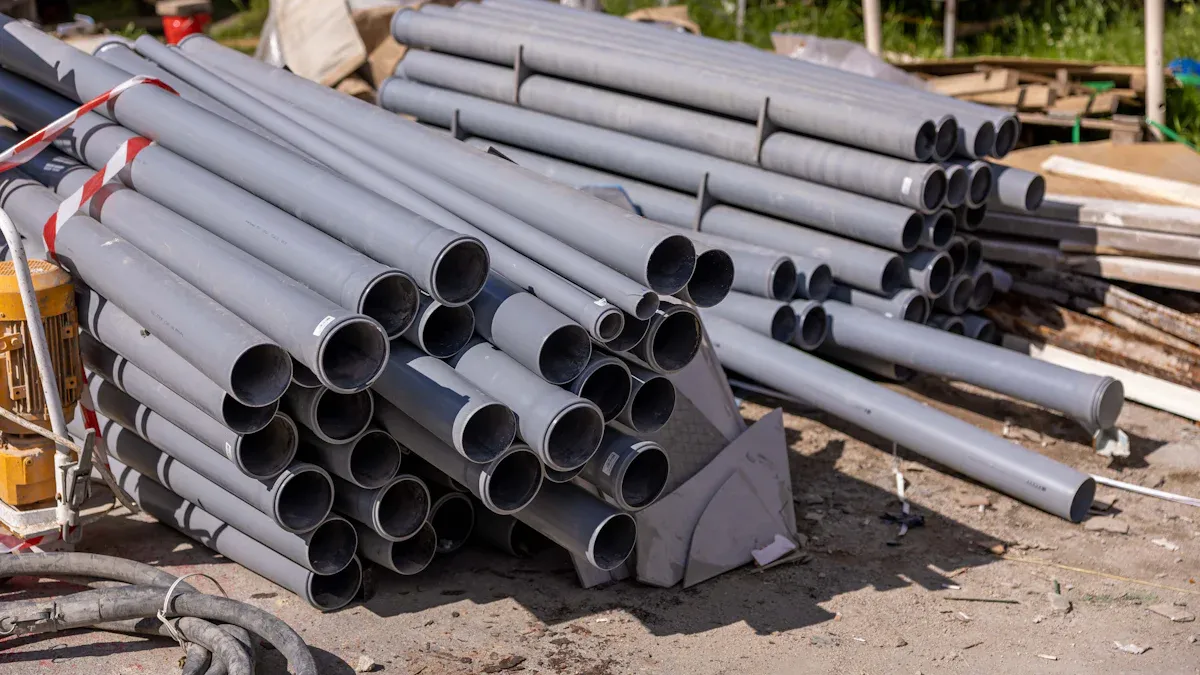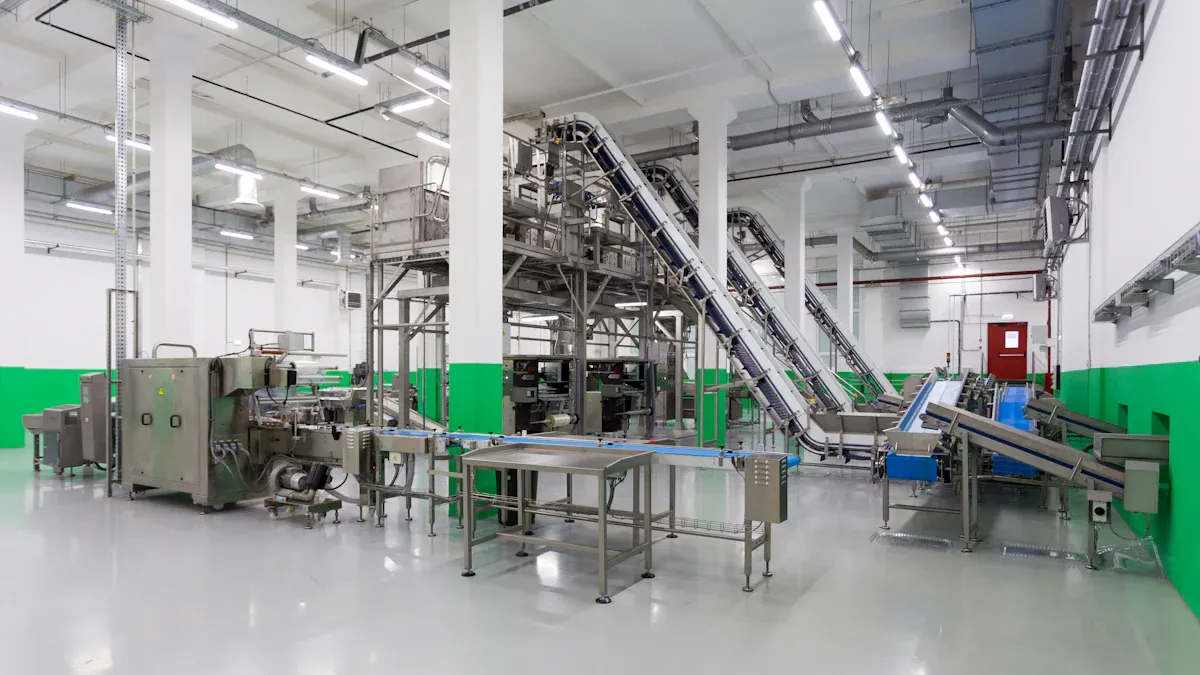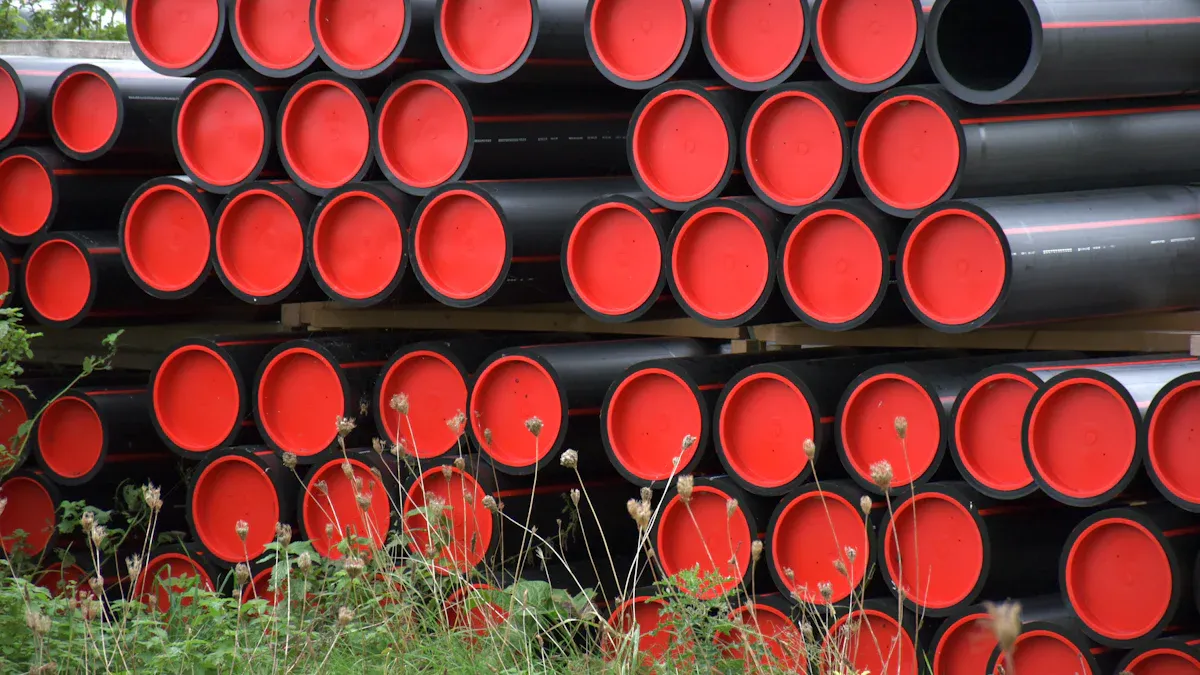
Large-diameter PVC pipe production often comes with challenges like high costs, inconsistent quality, and frequent equipment wear. The PVC Pipe Production Parallel Twin Screw technology offers a game-changing solution. It enhances mixing precision, leading to better quality control and material savings. Manufacturers also benefit from lower energy consumption due to reduced processing temperatures and shorter residence times. This technology, widely adopted in modern facilities, ensures higher production rates and reduced downtime. Companies like Zhejiang Jinteng Machinery Manufacturing Co., Ltd., known for their expertise in the Extruder Twin Screw Barrel Factory manufacturing, play a pivotal role in advancing this innovation. Their high-quality PVC Pipe Single Screw Barrel and Twin Screw Extruder Screw Barrels Factory solutions support manufacturers in achieving operational efficiency.
Challenges in PVC Pipe Production Parallel Twin Screw Applications
High material and energy costs
Producing large-diameter PVC pipes requires significant amounts of raw materials and energy. These costs can quickly add up, especially when manufacturers face inefficiencies in the extrusion process. Traditional extrusion methods often lead to material waste due to poor mixing precision or inconsistent processing temperatures. This waste not only increases expenses but also impacts sustainability efforts.
Energy consumption is another major concern. Extrusion machines that operate at high temperatures for extended periods consume more electricity, driving up operational costs. Manufacturers using outdated equipment may find it challenging to compete with those who have adopted energy-efficient technologies like PVC Pipe Production Parallel Twin Screw systems. These systems optimize energy use by maintaining consistent processing conditions, reducing waste, and lowering overall production costs.
Quality consistency issues
Maintaining consistent quality in PVC pipe production is critical. Variations in pipe thickness, strength, or surface finish can lead to product defects, customer dissatisfaction, and even regulatory non-compliance. Inconsistent mixing of raw materials is a common culprit behind these issues. When the PVC resin, stabilizers, and other additives are not evenly distributed, the final product may exhibit weak spots or uneven properties.
Parallel twin screw technology addresses this challenge by enhancing mixing precision. Its design ensures uniform distribution of materials, resulting in pipes with consistent quality. This not only reduces the likelihood of defects but also minimizes the need for rework or scrap, saving both time and resources. For manufacturers, achieving consistent quality is essential for building trust with customers and maintaining a competitive edge.
Equipment wear and maintenance costs
Equipment wear is an inevitable part of PVC pipe production, but its impact on costs can be significant. Over time, screws and barrels in extrusion machines experience wear, leading to increased radial clearance. This can cause leakage flow, reduced throughput, and higher energy consumption. Neglecting maintenance can result in catastrophic failures, unplanned downtime, and expensive repairs.
Establishing a regular maintenance schedule is crucial for managing these costs. Companies that prioritize structured maintenance can reduce downtime by up to 30%, avoiding costly emergency repairs. Allocating a budget for unexpected repairs also ensures smooth operations. Additionally, maintaining screws and barrels in good condition helps prevent quality issues, especially when processing shear-sensitive materials like PVC. By addressing equipment wear proactively, manufacturers can extend the lifespan of their machinery and improve overall efficiency.
Advantages of PVC Pipe Production Parallel Twin Screw Technology

Enhanced mixing precision for material savings
Efficient material usage is a top priority for manufacturers. The PVC Pipe Production Parallel Twin Screw system excels in this area by delivering superior mixing precision. Its design ensures that PVC resin, stabilizers, and additives blend evenly, creating a uniform melt. This precision reduces material waste, as there’s less need for rework or scrap due to inconsistencies.
Tip: Uniform mixing not only saves materials but also improves the overall quality of the final product. Pipes produced with consistent properties are less likely to fail during use, which boosts customer satisfaction.
Manufacturers also benefit from the system’s ability to handle a wide range of formulations. Whether working with standard PVC or custom blends, the parallel twin screw technology adapts seamlessly. This flexibility allows companies to optimize their material usage without compromising on quality.
Energy-efficient design for lower operational costs
Energy efficiency is another standout feature of the PVC Pipe Production Parallel Twin Screw system. Traditional extrusion methods often require high processing temperatures and extended operation times, leading to excessive energy consumption. In contrast, this advanced technology operates at lower temperatures and shorter residence times, significantly reducing electricity usage.
- Key benefits of energy efficiency:
- Lower utility bills, which directly impact the bottom line.
- Reduced carbon footprint, aligning with sustainability goals.
- Enhanced machine performance due to optimized thermal conditions.
For manufacturers, these energy savings translate into long-term cost reductions. By adopting energy-efficient systems, they can remain competitive in an industry where operational costs often dictate profitability.
Extended equipment lifespan and reduced downtime
Frequent equipment breakdowns can disrupt production schedules and inflate maintenance budgets. The PVC Pipe Production Parallel Twin Screw system addresses this issue with its robust design and durable components. Screws and barrels are engineered to withstand the wear and tear of high-volume production, extending their lifespan.
Note: Regular maintenance is still essential, but the system’s durability minimizes the frequency of repairs and replacements.
Reduced downtime is another major advantage. With fewer interruptions, manufacturers can maintain consistent production rates and meet delivery deadlines. This reliability not only improves operational efficiency but also strengthens customer trust. Investing in durable equipment like the parallel twin screw system ensures smoother operations and higher returns over time.
Real-World Benefits of PVC Pipe Production Parallel Twin Screw Solutions

Case studies showcasing cost reductions
Real-world examples highlight how PVC Pipe Production Parallel Twin Screw technology delivers measurable cost savings. For instance, Pipelife, a leading manufacturer, implemented the AM System to optimize its production processes. This change resulted in significant savings, including a reduction of SEK 190 thousand in license costs. By digitizing workflows, the company also saw a dramatic increase in reported improvement suggestions, jumping from 90 to 220 within a year. Similarly, deviations reported rose from 340 to 697, showcasing the system’s ability to enhance operational efficiency.
These results demonstrate how adopting advanced technologies can reduce expenses while improving productivity. Manufacturers using parallel twin screw systems benefit from precise material mixing and energy-efficient designs, which minimize waste and lower operational costs. Such success stories encourage other companies to explore similar solutions for their production lines.
Industry trends and adoption rates
The adoption of parallel twin screw technology is growing rapidly across the PVC pipe production industry. Automation and real-time diagnostics in extrusion machines are becoming standard, helping manufacturers achieve better precision and consistency. This trend aligns with the industry’s focus on speed-to-market and lean production processes, which are essential for staying competitive.
In the U.S., twin screw extrusion machines now hold over 50.47% of the plastic extrusion machine market. Their popularity stems from their superior mixing and compounding capabilities, which are critical for producing high-quality polymer products. Leading companies like Coperion and Leistritz have reported increased demand for these machines, linking it to improved product quality and consistency.
The global twin screw extruders market is also on the rise. It is projected to grow from USD 10.50 billion in 2024 to USD 11.28 billion by 2031, with a CAGR of 1.03%. This growth reflects the increasing demand for efficient and sustainable manufacturing processes. High-performance extrusion machines are now essential for modern production, enabling manufacturers to meet market demands while maintaining quality.
Parallel twin screw solutions offer a smart way to improve PVC pipe production. They tackle common challenges while boosting efficiency and profitability. Manufacturers can rely on these systems to stay competitive.
| Key Factors Influencing Growth | Insights |
|---|---|
| Market Segmentation | Type, Application, and others |
| Growth Rate Projections | Expected growth and opportunities |
| Industry Segment Analysis | Global, regional, and country-level insights |
By adopting this technology, businesses can ensure consistent quality and long-term success.
FAQ
What makes parallel twin screw technology better for PVC pipe production?
Parallel twin screw systems ensure precise material mixing, reduce waste, and lower energy use. Their durability also minimizes downtime, making them a cost-effective choice for manufacturers. ✅
How does this technology help reduce energy costs?
The system operates at lower temperatures and shorter residence times. This design reduces electricity consumption, helping manufacturers save on utility bills while improving production efficiency. ⚡
Can parallel twin screw systems handle custom PVC formulations?
Yes! These systems adapt to various formulations, ensuring consistent quality regardless of the blend. This flexibility makes them ideal for diverse production needs.
Post time: Apr-29-2025
